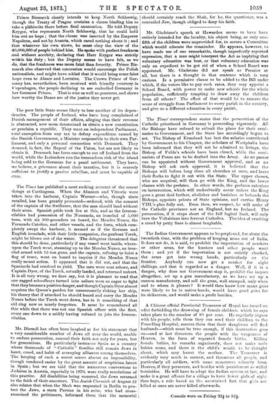The Times has published a most striking account of the
recent doings at Carthagena. When the Almanza and Vittoria were taken into the harbour, Captain Werner—who, though since recalled, has been greatly promoted—ordered, with the consent of the captain of the Swiftsnre, that the men should land without their arms. Spanish pride took fire at this, and as the Irrecon- oilables had possession of the Numancia, an ironclad of 5,000 tons, with six 300-pounders on board, the Mendez Nunez, the Fernando Catolico, and other vessels, and the forts, which com- pletely swept the harbour, it seemed as if the German and English ironclads, with their little companion, the gunboat Torch, might be blown out of the water. The delegates threatened that this should be done, particularly if any vessel went inside, where- upon the Torch went, steaming up to the Mendez Nunez, an iron- clad armed with 12-ton guns, and the captain, refusing to hoist a tag of truce, went on board to inquire if the Mendez Nunez really meant action. It appeared that it did not, and that the Spaniards had resolved to yield. The men were sent ashore, and Captain Dyer, of the Torch, actually landed, and returned unhurt. It is all very wrong, we dare say, but it is pleasant to read that our ragged schoolboys turned into sailors were so eager to fight that theybecame a positive danger, and though Captain Dyer almost requires the Queen's pardon for unnecessarily risking her ship, his theory that if attacked he should board and carry the Mendez Nunez before the Torch went down, has in it something of that old ring now so nearly forgotten. It must be remembered all this while that there was not one Spanish officer with the fleet, every one down to a middy having refused to join the Irrecon- cilables.






























 Previous page
Previous page